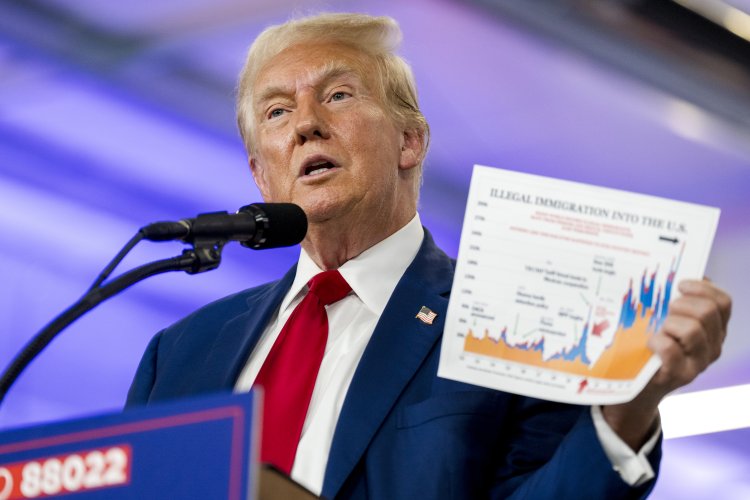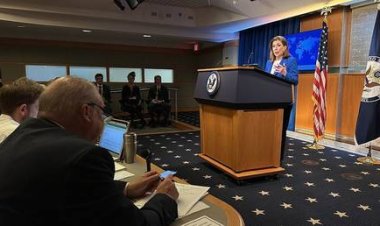Trump’s ‘shock and awe’ immigration strategy falters in the judicial system
Numerous judges throughout the nation, selected by presidents from both political parties, have issued rulings opposing Trump’s bold immigration policies.

An analysis of numerous lawsuits indicates that, despite Trump’s vigorous approach to border enforcement, other aspects of his immigration agenda have been largely thwarted. Courts are showing increased resistance to his strategies for the expedited detention and deportation of migrants residing in the U.S. Additionally, his efforts to revoke legal status from hundreds of thousands of immigrants who have been living lawfully in the country have not succeeded.
Trump’s notable deportation actions have encountered three setbacks from the Supreme Court, which has reminded the administration of its duty to afford “reasonable” due process to individuals accused, often without substantial evidence, of being “alien enemies.” Moreover, various district and appellate court judges, appointed by both Democratic and Republican administrations, have issued even stronger condemnations of the White House's actions.
One judge described Trump’s utilization of wartime powers to swiftly deport alleged Venezuelan gang members as “a path to perfect lawlessness.” Another judge noted that the administration’s detention of students with anti-Israel sentiments echoed the Red Scare and McCarthyism. A third judge warned that the absence of due process for certain deportees could lead to “persecution, torture, and death."
Trump and his domestic policy adviser, Stephen Miller, aimed for a “shock and awe” approach to immigration, as Elizabeth Goitein, a civil liberties and national security expert at the Brennan Center for Justice, pointed out. However, they have repeatedly overstepped their boundaries, according to Goitein's assessment.
“The courts are recognizing it for what it is,” she stated.
In light of unfavorable rulings, top aides to Trump have criticized the judiciary, labeling judges as “rogue” and “radical.” Trump has even called for the impeachment of specific judges. Recently, Miller accused judges obstructing Trump’s deportation measures of conducting a “coup,” an “insurrection,” and of “incinerating our Constitution.” The day after, yet another ruling hindered some of Trump’s deportation initiatives, this time from a judge appointed by Trump during his first term.
The Justice Department, while not mirroring the White House’s heightened rhetoric, has expressed concern over what it described as “a now troubling pattern of district courts superintending immigration proceedings.”
While Trump’s immigration agenda has not been entirely derailed—he has deployed thousands of troops to the southern border, strengthened immigration enforcement, and presided over a marked reduction in illegal border crossings—important policies obstructed by district judges are still pending appeals to higher courts, where Trump hopes for a favorable outcome.
In just over three months, Trump has accumulated an extraordinary number of initial legal defeats—especially with his varied attempts to conduct deportations with significantly less due process than conventional immigration court protocols permit.
Here’s a summary of the rising number of policies that have been invalidated or partially halted by the courts:
Summary deportations under the Alien Enemies Act: The Alien Enemies Act, enacted in 1798 to expel citizens of a hostile foreign nation, had only been invoked three times in U.S. history before Trump used it against Venezuelans he claimed were part of a criminal gang. An initial deportation wave on March 15 unfolded so rapidly that planes departed amid a court hearing as U.S. District Judge James Boasberg sought to intervene. Boasberg indicated he might hold administration officials in criminal contempt for disregarding his directives.
Judges in Colorado and Texas subsequently ruled that Trump had overreached his authority regarding the Alien Enemies Act. When immigration officials appeared ready to initiate a second wave of rapid deportations under the act, the Supreme Court intervened with an extraordinary late-night order mandating that the administration cease its actions.
Deportations to countries other than a migrant’s country of origin: There are instances where individuals facing deportation cannot legally be returned to their home country due to safety concerns acknowledged by Congress or courts. The Trump administration attempted to sidestep this issue by swiftly deporting individuals to “third-party” countries. A federal judge in Massachusetts prohibited this practice, claiming that the lack of individualized assessments regarding potential torture or persecution violated due process rights.
Temporary protected status for those fleeing humanitarian crises: The Trump administration moved quickly to revoke legal status from hundreds of thousands of individuals living in the U.S. to escape persecution, violence, or natural disasters in four countries: Cuba, Haiti, Nicaragua, and Venezuela. The Biden administration had extended these protections into Trump’s term, but Homeland Security Secretary Kristi Noem sought to rescind these extensions and implement new, expedited expiration deadlines.
Two judges—one in California and the other in Massachusetts—have issued blanket injunctions against these policies, postponing deportations for the time being. This week, the administration filed an emergency appeal with the Supreme Court to lift one of those injunctions.
Kilmar Abrego Garcia and “Cristian”: The case of Kilmar Abrego Garcia, who was wrongfully deported to El Salvador from Maryland, has generated particularly strong judicial language. The Supreme Court declared his deportation illegal because an immigration judge had prohibited the government from sending him there. A conservative appeals court judge criticized the administration’s actions as “shocking” to fundamental American liberties.
A district judge in Maryland is currently investigating the administration's failure to comply with her order to facilitate Abrego Garcia’s return. Meanwhile, in a less-publicized case, a Maryland judge recently ordered the return of a man labeled “Cristian,” who was also deported to El Salvador on the same day as Abrego Garcia, despite his pending asylum claim.
Mahmoud Khalil, Badar Khan Suri, Mohsen Mahdawi, and Rumeysa Ozturk: Another set of notable cases revolves around the Trump administration's attempts to deport college students and academic researchers who have expressed anti-Israel views. Secretary of State Marco Rubio has initiated their expedited deportation by citing an obscure immigration law provision that allows him to claim their presence in the U.S. harms American foreign policy interests. However, the academics contend they are being targeted solely for their pro-Palestinian beliefs, infringing on the First Amendment.
Recently, a judge in Vermont ordered the release of Mohsen Mahdawi, a student from Columbia University. Other prominent scholars—Mahmoud Khalil, a Columbia graduate student; Rumeysa Ozturk, a Tufts graduate student; and Badar Khan Suri, a Georgetown scholar—remain in detention as their deportation cases slowly progress. In all three cases, judges have mandated that deportations not commence until the legal proceedings are concluded.
In a broader legal challenge, a federal judge rejected the administration's efforts to dismiss claims that its policy targeting pro-Palestinian students is unconstitutional.
Full-time foreign students: The administration's flawed attempt to overhaul immigration policies is exemplified by its botched efforts to conduct criminal background checks on 1.3 million foreign students studying in the U.S. on valid visas. The search results were erroneously used to “terminate” students' records in a database tracking full-time international students, placing their legal residency at risk. However, the administration made multiple mistakes, flagging students for minor police encounters that should not have impacted their legal status.
Numerous lawsuits across multiple states halted this initiative entirely, resulting in over 50 restraining orders protecting more than 6,000 students from the repercussions of the administration’s actions. Ultimately, the administration reversed its course and abandoned the effort, although some lawsuits are still pending as students seek to ensure they are not targeted again.
Warrantless arrests in California: Miller's recent outburst against judges was fueled by a ruling from U.S. District Judge Jennifer Thurston, who determined that the Border Patrol had exceeded its legal authority regarding warrantless arrests and detentions. She ruled that agents did not meet the necessary legal criteria for such detentions, particularly the requirement to possess reasonable suspicion of illegal status, and ordered compliance with stricter standards.
Refugee admissions: When Trump attempted to suspend the admission of all refugees, a judge deemed the move illegal. A federal appeals court blocked part of the ruling yet mandated that the administration continue processing refugee admissions that had been approved prior to Trump taking office.
Redefining birthright citizenship: One of Trump's boldest immigration initiatives involved issuing an executive order on his first day back in office aimed at redefining the Constitution’s birthright citizenship guarantee. Three district judges in three separate courts promptly and decisively rejected this order. The Supreme Court is now set to determine whether these judges, each of whom issued nationwide blocks against the policy, overstepped their authority by not issuing more limited rulings.
Ian Smith for TROIB News












